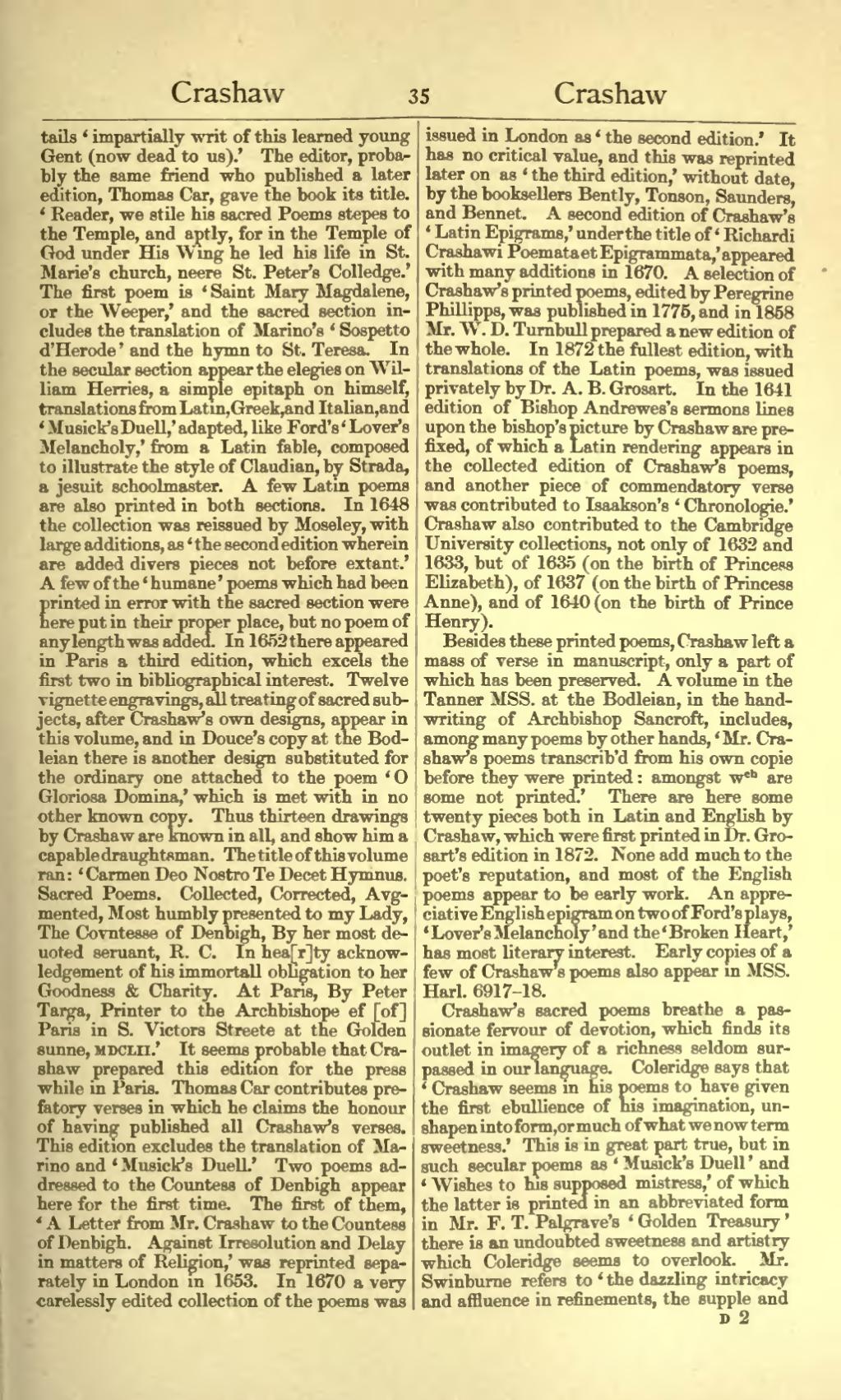tails ‘impartially writ of this learned young Gent (now dead to us).’ The editor gave the book its title. ‘Reader, we stile his sacred Poems stepes to the Temple, and aptly, for in the Temple of God under His Wing he led his life in St. Marie's church, neere St. Peter's Colledge.’ The first poem is ‘Saint Mary Magdalene, or the Weeper,’ and the sacred section includes the translation of Marino's ‘Sospetto d'Herode’ and the hymn to St. Teresa. In the secular section appear the elegies on William Herries, a simple epitaph on himself, translations from Latin, Greek, and Italian, and ‘Musick's Duell,’ adapted, like Ford's ‘Lover's Melancholy,’ from a Latin fable, composed to illustrate the style of Claudian, by Strada, a jesuit schoolmaster. A few Latin poems are also printed in both sections. In 1648 the collection was reissued by Moseley, with large additions, as ‘the second edition wherein are added divers pieces not before extant.’ A few of the ‘humane’ poems which had been printed in error with the sacred section were here put in their proper place, but no poem of any length was added. In 1652 there appeared in Paris a third edition, which excels the first two in bibliographical interest. Twelve vignette engravings, all treating of sacred subjects, after Crashaw's own designs, appear in this volume, and in Douce's copy at the Bodleian there is another design substituted for the ordinary one attached to the poem ‘O Gloriosa Domina,’ which is met with in no other known copy. Thus thirteen drawings by Crashaw are known in all, and show him a capable draughtsman. The title of this volume ran: ‘Carmen Deo Nostro Te Decet Hymnus. Sacred Poems. Collected, Corrected, Avgmented, Most humbly presented to my Lady, The Covntesse of Denbigh, By her most deuoted seruant, R. C. In hea[r]ty acknowledgement of his immortall obligation to her Goodness & Charity. At Paris, By Peter Targa, Printer to the Archbishope ef [of] Paris in S. Victors Streete at the Golden sunne, mdclii.’ It seems probable that Crashaw prepared this edition for the press while in Paris. The poet's friend Thomas Carre [q. v.] contributes prefatory verses in which he claims the honour of having published all Crashaw's verses. This edition excludes the translation of Marino and ‘Musick's Duell.’ Two poems addressed to the Countess of Denbigh appear here for the first time. The first of them, ‘A Letter from Mr. Crashaw to the Countess of Denbigh. Against Irresolution and Delay in matters of Religion,’ was reprinted separately in London in 1653. In 1670 a very carelessly edited collection of the poems was issued in London as ‘the second edition.’ It has no critical value, and this was reprinted later on as ‘the third edition,’ without date, by the booksellers Bently, Tonson, Saunders, and Bennet. A second edition of Crashaw's ‘Latin Epigrams,’ under the title of ‘Richardi Crashawi Poemata et Epigrammata,’ appeared with many additions in 1670. A selection of Crashaw's printed poems, edited by Peregrine Phillipps, was published in 1775, and in 1858 Mr. W. B. Turnbull prepared a new edition of the whole. In 1872 the fullest edition, with translations of the Latin poems, was issued privately by Dr. A. B. Grosart. In the 1641 edition of Bishop Andrewes's sermons lines upon the bishop's picture by Crashaw are prefixed, of which a Latin rendering appears in the collected edition of Crashaw's poems, and another piece of commendatory verse was contributed to Isaakson's ‘Chronologie.’ Crashaw also contributed to the Cambridge University collections, not only of 1632 and 1633, but of 1635 (on the birth of Princess Elizabeth), of 1637 (on the birth of Princess Anne), and of 1640 (on the birth of Prince Henry).
Besides these printed poems, Crashaw left a mass of verse in manuscript, only a part of which has been preserved. A volume in the Tanner MSS. at the Bodleian, in the handwriting of Archbishop Sancroft, includes, among many poems by other hands, ‘Mr. Crashaw's poems transcrib'd from his own copie before they were printed: amongst wch are some not printed.’ There are here some twenty pieces both in Latin and English by Crashaw, which were first printed in Dr. Grosart's edition in 1872. None add much to the poet's reputation, and most of the English poems appear to be early work. An appreciative English epigram on two of Ford's plays, ‘Lover's Melancholy’ and the ‘Broken Heart,’ has most literary interest. Early copies of a few of Crashaw's poems also appear in MSS. Harl. 6917–18.
Crashaw's sacred poems breathe a passionate fervour of devotion, which finds its outlet in imagery of a richness seldom surpassed in our language. Coleridge says that ‘Crashaw seems in his poems to have given the first ebullience of his imagination, unshapen into form, or much of what we now term sweetness.’ This is in great part true, but in such secular poems as ‘Musick's Duell’ and ‘Wishes to his supposed mistress,’ of which the latter is printed in an abbreviated form in Mr. F. T. Palgrave's ‘Golden Treasury’ there is an undoubted sweetness and artistry which Coleridge seems to overlook. Mr. Swinburne refers to ‘the dazzling intricacy and affluence in refinements, the supple and
